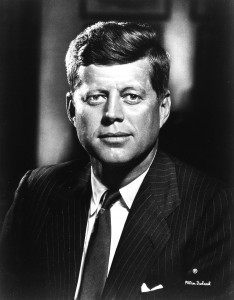On Nov. 22, 1963 President John F. Kennedy was assassinated in Dallas, Texas. Around 68% of Americans learned about the assassination within 30 minutes. This estimate is mentioned by Mitchell Stephens in the chronology of his book A History of News. Stephens also emphasized that there was nonstop coverage by television of Lee Harvey Oswald who was accused. There is no denying that the JFK assassination completely transformed media coverage.
It is interesting to analyze the effect of the media throughout the life of JFK and after his death. Going back to September 26, 1960 there was the first televised debate. The debate between Kennedy and Richard Nixon portrayed the power that television can have. It has been estimated that around 74 million people tuned in to watch the debate that night. After winning the election Kennedy stated, “It was the TV more than anything else that turned the tide.” Fast forward to 1963 his assassination would change television reported breaking news stories, and it would set new standards. Tierney Sneed reporter for U.S. News & World Report in an article portrayed just how extensive the coverage actually was. She stated,
“Not only did news of Kennedy’s death reach Americans quickly via their TV screens, it stayed there for the days to come…The Big Three broadcast much of their assassination coverage without commercials. By Mayo’s count, CBS clocked in with 55 total hours, ABC played 60 hours and NBC – airing an all-night vigil from the Capitol Rotunda on Sunday – broadcast 71 hours of coverage that weekend.”
In an article written by Jon Herskovitz for Reuters, he explained the significance of the reporting. There wouldn’t be this much live coverage of news events until the September 11, 2011 attacks. 9 percent of households in the U.S. had televisions, whereas in 1960 it had gone up to a staggering 90 percent. In his article Herskovitz reported,
“”The Kennedy assassination became the template for coverage,” said Bob Schieffer, who 50 years ago covered the event for the Fort Worth Star Telegram and is now a veteran broadcaster with CBS…”This is when America became a TV nation,” said Patty Rhule, a senior manager of exhibits at the Newseum, a museum for the news industry in Washington…”The fact that the tragedy was brought live into people’s houses made for compelling viewing, no matter where you were,” said Gary Mack, curator of The Sixth Floor Museum in Dallas…”
The JFK assassination has been written about in at least a hundred different books and publications. It is regarded by many as one of the most controversial cases in modern American history.


Leave a response